Rebound Insomnia: What It Is and How to Prevent It
There’s no better feeling than overcoming insomnia. You can finally rest easy and get the deep sleep you need and deserve. Unfortunately, when rebound insomnia rears its ugly head, you may be faced with the same symptoms that plagued you before — only worse.
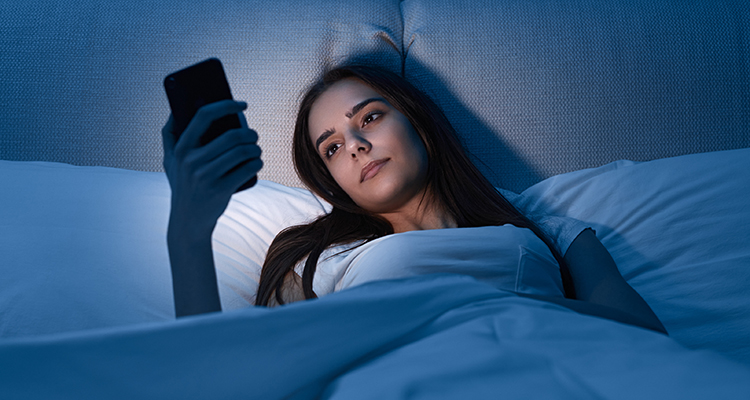
Because most cases of insomnia are caused by an underlying medical condition, lifestyle change, or another external factor, there’s never a full-proof cure for this sleeping disorder. When all else fails, many people turn to medication to achieve a good night’s sleep. Unfortunately, this remedy can have serious side effects, including rebound insomnia.
Here we’ll explore exactly what rebound insomnia is, why it happens, and how to overcome it.
Content
Check out our video on rebound insomnia!
What is Rebound Insomnia?
Rebound insomnia is a state of worsening sleep conditions compared with baseline. It occurs following withdrawal from certain medications including triazolam, flunitrazepam, and nitrazepam. It’s also a common side effect of using and then stopping the use of popular sleeping pills such as Lunesta, Ambien, Benadryl, and more. In most cases, rebound insomnia happens after taking only a single dose at night for short periods of time.
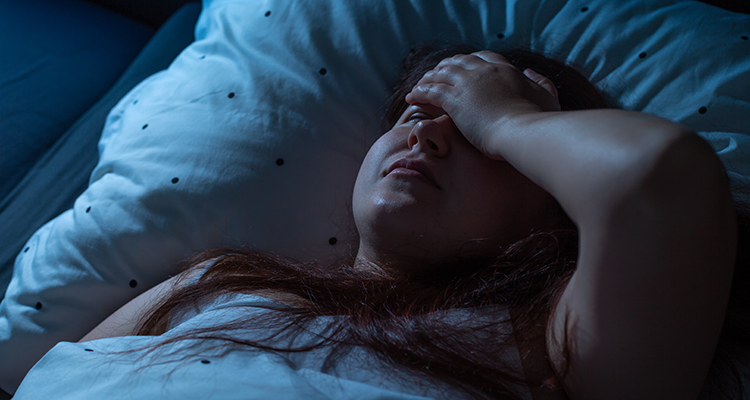
It’s this short, intermediate use of the drug that causes this intense reaction. Short-acting benzodiazepine drugs may also cause rebound insomnia and are associated with drug dependency.
These symptoms also depend on the drug’s half-life, which is the amount of time it takes for the drug’s active ingredients to reduce to half inside your system. Depending on the type of drug, how often you use it, and how your body processes it, the half-life can take anywhere from a few hours to a few days or even weeks.
Symptoms of Rebound Insomnia
If you suffer from chronic insomnia, the idea that your condition and lack of sleep could worsen may seem impossible. Unfortunately, the effects of rebound insomnia can cause some people to lose sleep for days at a time. Your sleep condition and quality of sleep may progressively worsen over time, leaving you desperate and hopeless.
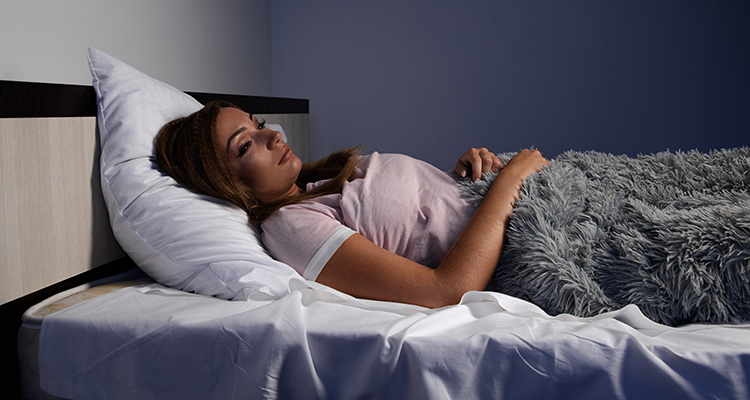
Rebound insomnia is most likely to happen after abruptly stopping a sleeping medication that you’ve been using daily for some time. The higher the dose, the stronger the effects. Both prescription and over-the-counter sleep aids can cause rebound insomnia. The intensity of symptoms is also affected by how sensitive you are to the withdrawal process. No two insomnia sufferers are the same. One person may feel minimal effects while someone else might struggle to sleep for hours or days once they discontinue use.
Other factors that exacerbate your rebound insomnia symptoms include stress, panic or paranoia over lack of sleep, and unhealthy sleep habits. For those who’ve grown accustomed to taking a sleeping aid regularly, the thought of trying to sleep without it can be extremely troubling. It may even cause psychological distress.
This is another reason to avoid the “cold turkey” method of stopping your sleep medication suddenly. You may find your worry spike at night, making it even more difficult to achieve a good night’s sleep. When you finally do fall asleep and wake the next morning, your fitful night will likely be at the forefront of your mind. It may even drive you to start taking sleep medication again in the hopes of preventing a relapse of mental and emotional distress.
As mentioned previously, the half-life of the medication you take also plays an important role. The shorter the half-life, the faster symptoms will dissipate but the more intense they might be.
Rebound Insomnia Causes
We’ve already covered that rebound insomnia happens when someone abruptly discontinued the use of sleeping pills or medication. But several other factors are at play here that can affect how intensely you experience these side effects.
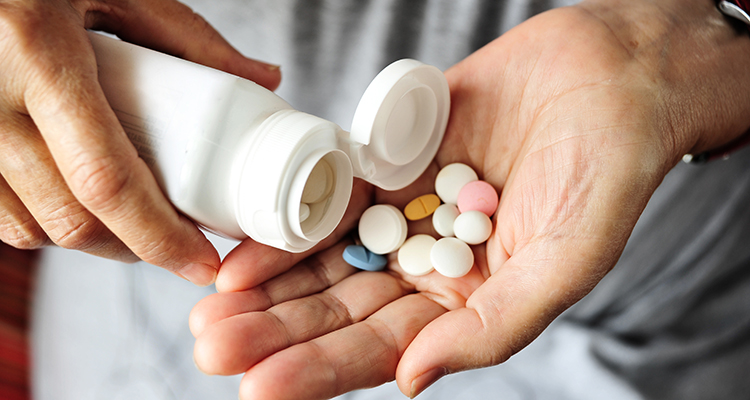
To understand what causes rebound insomnia, you must first understand how sleeping aids work. Sleeping pills enhance the natural chemicals in your brain and nervous system that trigger sleep. These neurotransmitters include melatonin, serotonin, tryptophan, and GABA. Some medications like Belsomra block the “awake” signal that hypocretin (also known as orexin) delivers to the brain.
When you suddenly stop taking these medications, your brain and body are slightly traumatized. Your system is at a stand-still, unsure of how to function normally with the presence of these drugs. Your sleep-wake cycle (circadian rhythm) is disrupted. With the presence of these drugs in your system, your natural sleep process slows down in an effort to control and regulate the increase in chemical levels. When you abruptly stop feeding your body these chemicals, your body suffers a deficit that can’t be immediately recovered.
Tolerance and Dependence
As with most drugs, sleeping pills can create both tolerance and dependence within the body. The more you consume these sleep aids, the more tolerant your body becomes. Tolerance occurs when your body develops an immunity to something. The more often and the higher dose of sleeping pills you take, the more your body needs to achieve the same desired results. Over time, the pills work less and may even stop working completely.
Physical dependency is another risk of taking and discontinuing the use of sleeping pills to treat insomnia. When you can’t fall asleep without the help of a sleep aid, your body is now dependent on it and can’t function normally without it. Certain medications like Ativan and other benzodiazepines can cause seizures and dangerous changes in your blood pressure and heart rate.
Understanding the Half-Lives of Sleeping Pills
Certain sleep aids are stronger than others and their effects last much longer. This is known as the half-life of the pill, or how long it takes for your body to process the active ingredients. Knowing the half-lives of the most popular sleep medications can better prepare you for the side effects of rebound insomnia.

By definition, the half-life of a drug is how long it takes for half the dose to be metabolized, reducing its levels and effects within the body.
Here are some of the most popular sleeping pills and their half-lives to give you a better idea of which medications last longer and which may have more dramatic withdrawal symptoms.
- Lunesta (eszopiclone) – 6 hours
- Ambien (zolpidem) – 2.5 to 3 hours
- Benadryl (diphenhydramine) – 3.5 to 9 hours
- Selinor (doxepin) – 15 hours
- Xanax (alprazolam) – 11 hours
Drugs with a short half-life will metabolize and be out of your system quickly, but your rebound insomnia may start much sooner with more intense side effects. The good news is, these side effects will also dissipate more quickly. Most symptoms from half-life sleep medications fade after a few days.
Medications with a longer half-life may not cause as intense of rebound symptoms but they often last longer.
How to Treat Rebound Insomnia
Treating rebound insomnia is more about preventing it than anything else. If you’re currently taking sleep medications (prescription or over-the-counter), you need to gradually reduce the dose. Avoid stopping use abruptly. This will send your body into shock and make it even more difficult to achieve sleep.
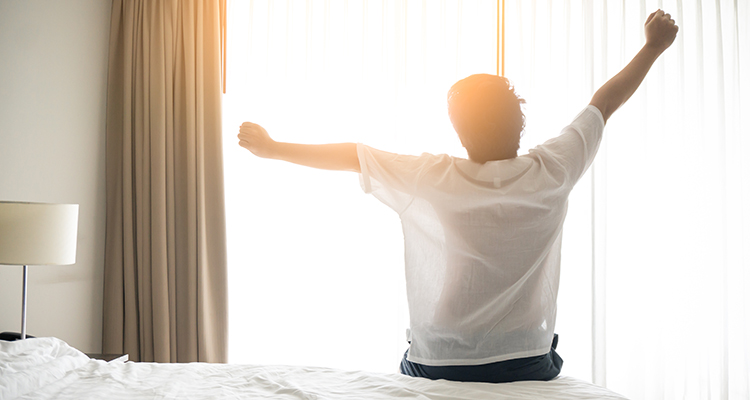
The onset reaction to sleep aid withdrawal is the need for more. When you stop taking a sleeping pill, chances are, your insomnia will return and you’ll feel the need to start taking the medication again. Rest assured, these withdrawal symptoms are short-lived. Most side effects resolve themselves after a few days.
You may also be tempted to substitute a different medication for your old one. Try to fight these urges. If not, you’ll enter into a vicious cycle and your body will never return to its natural sleep patterns. Instead, go to bed when you’re feeling tired and step outside for 15-20 minutes of sunlight. This process is known as sleep restriction and can help you fall asleep faster when faced with rebound insomnia. The ultimate goal is to only spend between 6 and 7 hours in bed.
In terms of prevention, try to find other ways to treat your insomnia that don’t involve using sleep aids. If you can’t do without them, try not to escalate the frequency or dose. Avoid using more than one sleep aid at a time and never mix these medications with alcohol.
Don’t Let Rebound Insomnia Get You Down
While rebound insomnia is common, it can still be disheartening. Just when you feel like you’ve found a cure for those sleepless nights, you’re hit with even worse, more fitful sleep. Rebound insomnia occurs when you stop taking whatever sleep aid you’ve become dependent on. One way to prevent this is to not take a sleeping pill at all. Unfortunately, this isn’t possible for those with severe insomnia.

If you have no choice but to take medication for your condition, choose a sleep aid with a short half-life and wean yourself off. Stopping abruptly will intensify your symptoms. Avoid swapping one medication for another and, instead, adopt new and healthier alternatives for battling insomnia.
At Somnus Therapy, we offer a wide range of treatment options from CBT and sleep restriction to stimulus control and mindfulness. With a multi-faceted approach to treating insomnia, you can avoid taking potentially harmful medications and start achieving the quality night’s sleep you deserve.
Click here to start your journey now!














